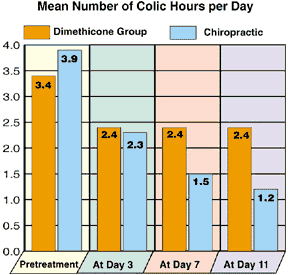Back pain? Blame the psoas. Seems as if everybody wants to dive headfirst into their psoas at the first sign of trouble with the lumbopelvic-hip region. Perhaps no other muscle is blamed more for causing problems than the psoas. Yes, it is an important stabilizer of the lumbar spine, but it shouldn't be the only one on which you focus. There is another big player on the scene: the iliacus.
Chiropractic Found Effective for Infantile Colic
A randomized, controlled clinical trial on colic in Denmark that compared chiropractic adjustments to daily doses of dimethicone has concluded: "Spinal manipulation has a positive short-term effect on infantile colic."1
Infantile colic is a curious and mysterious condition. It is estimated that, on average, 22.5% of all newborns suffer from colic, defined as "uncontrollable crying in babies from 0-3 months old, more than three hours a day, more than three days a week for three weeks or more, usually in the afternoon and evening hours." But only "47 percent of infantile colic cases have disappeared by the age of three months, a further 41 percent disappeared before six months of age, and the remaining 12 percent of cases persevered until between the ages of 6 and 12 months."
First described in 1894, colic has no verified cause(s). Countless studies have, however, determined what it is not caused by: air or constrictions in the intestines; gastrointestinal transit time; intestinal hormones; intestinal microflora; method of delivery (vaginal, Cesarean section or vacuum extraction); use of pudendal block; epidural analgesia; general anesthesia; or intravenous oxytocin.
Numerous medical and nonmedical treatments have been studied, including: music and sounds; vibration; dicyclomine hydrochloride; gripe-water; alcohol; atropine; skopyl; phenobarbital; merperidine; homatropine; and merbentyl. These treatments have shown either "no effect when compared to placebo treatment" or "serious side effects." Treatment with sucrose does seem to have a "generalized analgesic effect in infants and may therefore also help in infantile colic."
Dimethicone, the drug used in this randomized trial, has been shown to be "no better than placebo treatment" in several good controlled studies.
The first retrospective chiropractic study on treating colic was conducted in 1985, followed by a prospective multicenter study in 1989. "Both studies suggest that there seems to be a positive effect of spinal manipulation for infantile colic," but since neither study had a control group, it was impossible to assess whether the chiropractic treatments were significantly better than placebo.
The Danish National Health Service recruited 50 infants meeting the criteria for colic. After they were reviewed and monitored, they were randomly assigned to two groups: dimethicone daily for two weeks or spinal manipulation for two weeks by a local chiropractor. The 25 infants under chiropractic care received motion palpation to locate "articulations" mostly found in the upper and mid-thoracic area. The infants in the chiropractic group received an average of 3.8 adjustments.
During the two-week treatments, the parents kept a colic diary and nurses visited the families to administer a weekly "infantile colic behavior profile." The results were:

The dimethicone group would have fared much worse than these results suggest if not for the dropout rate of the medicated group. All 25 infants in the manipulation group completed the 13 days of treatment, but there were nine dropouts in the dimethicone group: five dropped out before the first week's diary could be completed, and thus there was no data on the hours of crying for those five subjects. But the study did register the subjective evaluation of four of the five in the dimethicone group that quit in the first week: two described their child's condition as "worsened" and two others described it as "much worsened." Had these four infants completed the study, they would have significantly affected the limited positive effect of dimethicone. To quote the authors:
"By excluding data from the dropouts, we are excluding more severe cases from the dimethicone group, and this has the effect of making that group appear better than it actually was." The authors make another comment that speaks directly to the issue:
"Spinal manipulation is normally used in the treatment of musculoskeletal disorders, and the results of this trial leave open two possible interpretations. Either spinal manipulation is effective in the treatment of the visceral disorder infantile colic or infantile colic is, in fact, a musculoskeletal disorder, and not, as normally assumed, visceral. This study does not address this issue."
Reference
1. Wiberg JMM, Nordsteen J, Nilsson N. The short-term effect of spinal manipulation in the treatment of infantile colic: A randomized controlled clinical trial with a blinded observer. J Manipulative Physiol Ther 1999;22:517-22.



